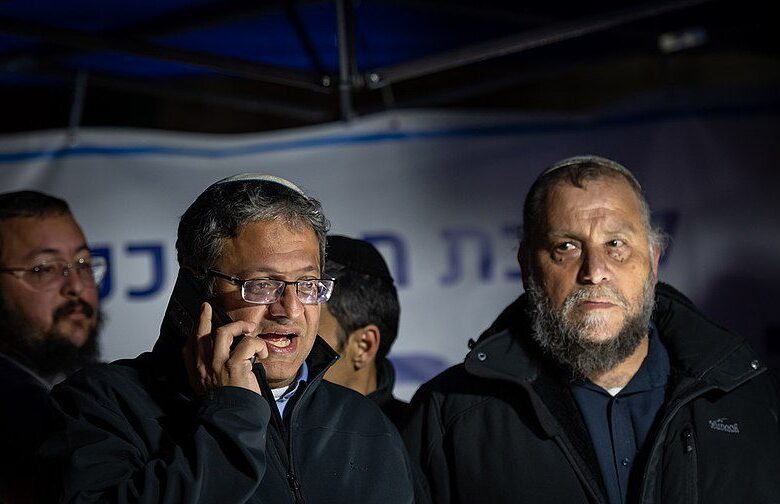
Knesset members Itamar Ben-Gvir and Avi Maoz in Sheikh Jarrah. Photo by Shai Kendler, licensed under a Creative Commons Attribution 4.0.
Israeli government forces are conducting security operations throughout the West Bank in the wake of multiple attacks, marking one of the deadliest weeks in the country. On Friday, January 27th, seven Israelis were shot dead outside a synagogue in East Jerusalem by a Palestinian gunman, and another two were injured the following day in a similar attack by a 13-year-old boy. The Israeli army is now increasing the number of troops based in the West Bank, saying it is “reinforcing the Judea and Samaria Division (West Bank) with an additional battalion.” Following a cabinet meeting, Prime Minister Benjamin Netanyahu has also announced a decision to arm thousands of Israeli citizens by speeding up and expanding the weapons licensing.
Following the death of the gunman on Friday during a shootout with Israeli security, police have swept through his neighbourhood of at-Tur, and have arrested 42 neighbours and family members for questioning, in what Arabic media is describing as ‘collective punishment.’ While no group has claimed the attack, several have reportedly celebrated and lauded it, such as Hamas, Hezbollah, and Palestinian Islamic Jihad (PIJ).
Violence is at a high, as the previous Thursday nine Palestinians were killed in a raid by the Israeli Defence Force (IDF) on the Jenin refugee camp, with over 20 wounded. Online source Popular Front claims that of the dead, four were Hamas militants, two belonged to PIJ, and one to the Fatah armed wing, with the remaining two being civilian casualties. Early Friday morning, Gaza fired three rockets at Israel as the IDF conducted airstrikes against what it described as Gazan rocket workshops.
All of this constitutes a strong test for the new right-wing coalition government of Israel. Netanyahu returned to power last year in a coalition with ultra-nationalist and religious orthodox parties. This followed a long-running political crisis that saw a liberal opposition that refused to cooperate with “Bibi,” and a conservative bloc that refused to let him go. However, the coalition which helped Netanyahu break this deadlock has named its price, gaining several important ministries.
Chief among them is the ministry of security, which is being led by Itamar Ben-Gvir, leader of the ultranationalist Otzma Yehudit (‘Jewish Power’) party, which advocates a ‘one-state solution’, wherein Israel should annex the West Bank. The decision to grant more arms to Israeli citizens and to strengthen settlements reflects previous statements of Ben-Gvir. How well stability and security are restored will provide a telling evaluation of not just him, but also the whole coalition which is focused on law and order.
Meanwhile, the government itself faces massive protests against its planned reform of the judicial system, which many say represents a threat to Israel’s rule of law and separation of powers. While a protest of over 100,000 went ahead this weekend in Tel Aviv, it remains to be seen if a rise in inter-communal violence will quash such dissension as calls for intra-Israeli unity get stronger.
